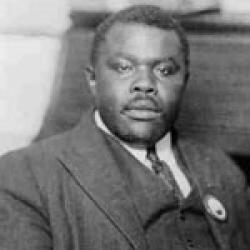
Published date
17 August 1887
Marcus Garvey's name is synonymous with Pan-Africanism and the Rastafari Movement. He was born in Jamaica on 17 August 1887, and as a young man developed a love for reading. At the age of 14, Garvey went left for Kingston to work in a printing house, where some years later he was elected vice president of the Kingston Union.
Following his involvement in a strike, he left Jamaica, travelled to Central America and started a newspaper called La Nacionale in 1911. He then left for London and wrote for the African Times and Orient Review, where he developed his ideas on black unity. Upon his return to Jamaica in 1914, he founded the Universal Negro Improvement Association (UNIA), in which his ideal of uniting the African diaspora could be realised.
Garvey then travelled to the United States in the hopes of raising funds to establish a private black university in Jamaica. Two years after his arrival in the United States, Garvey held his first public lecture in New York City.
By May 1917, he had established the first UNIA branch outside Jamaica. He began to address the issues of social, political and economic equality for black people and set about developing an economic programme for the advancement of black people world-wide, which included the purchase of ships for the repatriation of the black diaspora to Africa, Liberia in particular.
Apart from his role in the development of Pan-Africanism, Garvey is associated with the Rastafari Movement as he often made reference to an African king who would bring deliverance. This king is thought to be Haile Selassie I of Ethiopia, who is seen to be the manifestation of Garvey's prophecy.
Garvey is therefore credited with creating the largest movement for people of African descent, with greater participation than the Civil Rights Movement.
References
John Simkin,(1997), 'Marcus Garvey', from Spartacus Educational [Online], Available at: spartacus.schoolnet.co.uk, [Accessed: 08 August 2013]|Garvey, Marcus; Jacques-Garvey, Amy (ed.) (1986), 'The philosophy and opinions of Marcus Garvey or Africa for the Africans', Dover (Massachusetts): Majority Press. p. 163. ISBN 0-912469-24-2